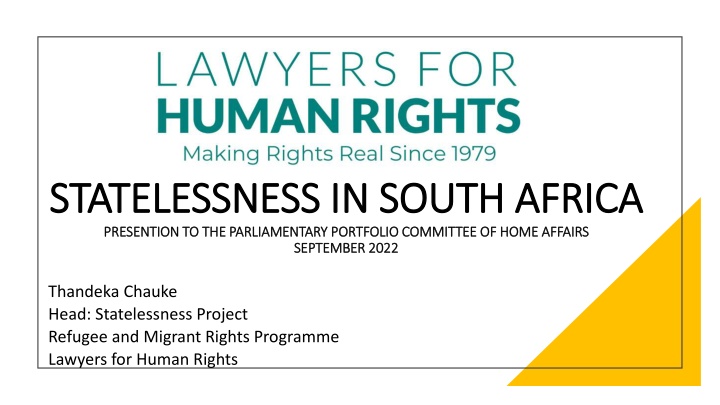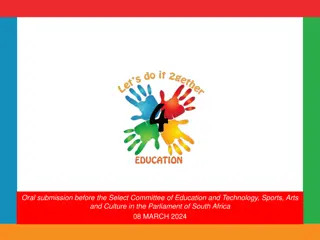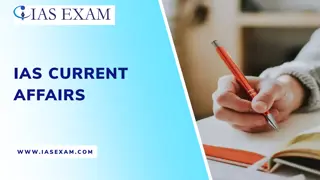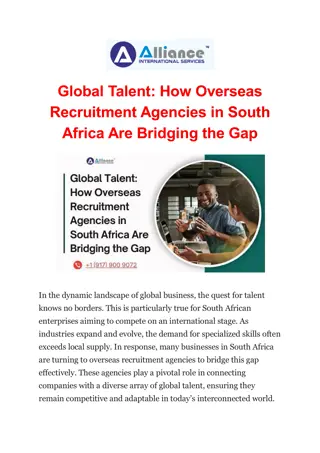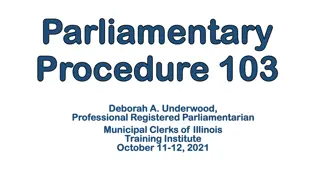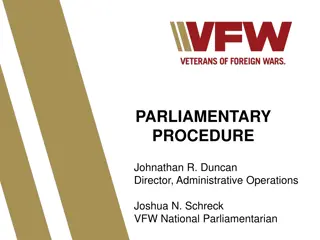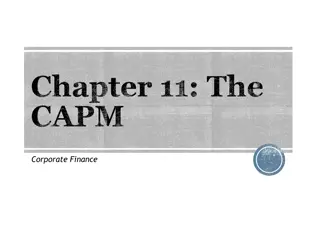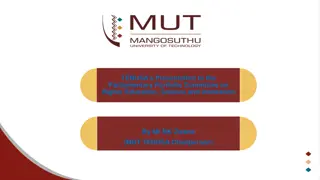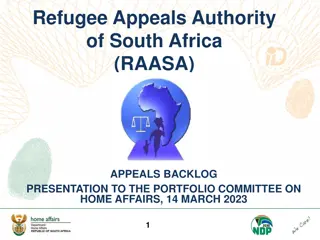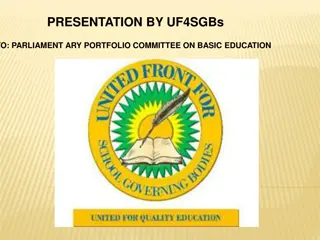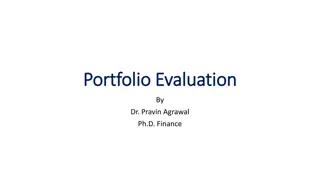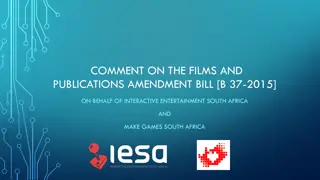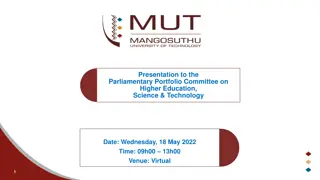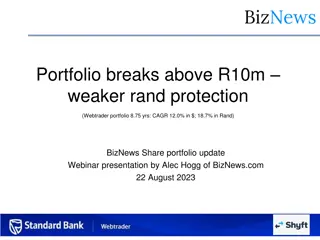Statelessness in South Africa: Presentation to the Parliamentary Portfolio Committee of Home Affairs, September 2022
This presentation covers the issue of statelessness in South Africa, highlighting the challenges faced by stateless individuals in obtaining legal identity, particularly in relation to birth registration. It discusses the implications of lacking nationality, discriminatory practices in birth registration, and the need for legal reforms to address these issues. Recommendations are provided to ensure the protection of human rights for all individuals residing in South Africa.
Download Presentation

Please find below an Image/Link to download the presentation.
The content on the website is provided AS IS for your information and personal use only. It may not be sold, licensed, or shared on other websites without obtaining consent from the author.If you encounter any issues during the download, it is possible that the publisher has removed the file from their server.
You are allowed to download the files provided on this website for personal or commercial use, subject to the condition that they are used lawfully. All files are the property of their respective owners.
The content on the website is provided AS IS for your information and personal use only. It may not be sold, licensed, or shared on other websites without obtaining consent from the author.
E N D
Presentation Transcript
STATELESSNESS IN SOUTH AFRICA STATELESSNESS IN SOUTH AFRICA PRESENTION TO THE PARLIAMENTARY PORTFOLIO COMMITTEE OF HOME AFFAIRS PRESENTION TO THE PARLIAMENTARY PORTFOLIO COMMITTEE OF HOME AFFAIRS SEPTEMBER 2022 SEPTEMBER 2022 Thandeka Chauke Head: Statelessness Project Refugee and Migrant Rights Programme Lawyers for Human Rights
SNAPSHOT OF STATELESSNESS IN SOUTH AFRICA SNAPSHOT OF STATELESSNESS IN SOUTH AFRICA A stateless person is a person who is not recognised as citizen of any country in the world i.e., has no nationality. (Article 1 of the 1954 UN Convention on Status of Stateless Persons) Stats globally 3.9 million known to be stateless, but estimates are higher at about 10 million domestically approximately 10 000 stateless in SA (includes unrecognised South Africans and migrants) and approx. 15 million without legal identity Definition of a stateless person under the 1954 UN Convention includes two main manifestations of statelessness: the law, and the implementation of the law.
1. ACCESS TO BIRTH REGISTRATION 1. ACCESS TO BIRTH REGISTRATION parents must hold valid identity documentation: child s right to birth registration made contingent on parents documentation status = increases risk of generational lack of documentation or generational statelessness. In 2018, High Court ruled BDRA regulations unconstitutional and ordered that parents should submit documentation where it is available (affects children whose parents are unregistered SA citizens, SA citizens with blocked IDs, undocumented refugees or migrants) (Menzile Naki and another v Director General: Department of Home Affairs and Another (4996/2016) [2018] ZAECGHC 90) discrimination against children born to unmarried parents: In 2021, Constitutional Court declared S10 BDRA unconstitutional with the effect that mothers and fathers should have equal rights to register birth of children despite marital status. BUT LHR has report of 30+ children with SA citizen fathers denied birth registration post judgment. DHA offices refuse to assist without directives from head office, or claim to be unaware of judgment, or refuse to issue DNA referral letter, or refuse to accept DNA results, or refuse to assist if mother is undocumented/migrant) (Centre for Child Law v Minister of Home Affairs CCT 101/20 [2021] ZACC 31) arbitrary, discriminatory and exclusionary DNA testing: DHA Circular 5 of 2014 requires proof of paternity in the form of DNA test results if one parent is a non-SA citizen and where DHA official has reasonable suspicion regarding paternity of child = discrimination against children born to a non-SA citizen parent as DHA official has unfettered discretion, cost of DNA is prohibitive for poor or indigent families (NHLS R750 pp, private R1 500+ pp), the DNA requirement is ultra vires as the BDRA only refers to proof (alternative forms of proof could include: lobola agreements, damages, proof of birth form, affidavits, biometrics) backlogs and unreasonable delay in processing late registration of birth applications: delays in panel interviews, delays in issuing birth certificate, applications rejected without reasons Currently - 451 LHR clients | Past 5 years 1 213 LHR clients
Lawyers for Human Rights - Statistical Report - Statelessness Project - ALL OFFICES List of Birth Registration Cases demographic characteristics and country of origin from 2017/1/1 - 2022/9/1 Female Male Other Grand Total Origin 0-4 5-11 12-17 18-59 60+ Unkn. Total 0-4 5-11 12-17 18-59 60+ Unkn Total 0-4 5-11 12-17 18-59 60+ Unkn Total 1 1 3 12 35 52 1 4 4 2 9 2 1 15 34 86 Botswana Burundi Cameroon Canada DRC Ethiopia France Ghana India Ivory Coast Kenya Lesotho Malawi Mozambique Namibia Nigeria Pakistan Rwanda South Africa Swaziland Tanzania Uganda Unknown Zambia Zimbabwe TOTAL 4 1 1 4 7 1 2 3 3 6 1 1 1 7 3 1 1 2 2 15 25 9 3 3 1 4 16 41 10 3 6 4 1 2 2 1 1 5 3 2 1 1 2 3 1 2 2 1 2 2 1 1 8 8 27 1 2 46 1 11 8 1 3 6 5 4 1 1 26 72 16 41 5 4 9 1 2 7 9 1 1 4 1 24 1 2 32 1 1 2 4 1 1 1 2 1 2 1 3 67 79 45 203 14 5 413 60 69 50 215 15 4 413 826 3 3 1 1 1 2 3 6 2 1 3 2 9 2 1 8 3 1 1 3 1 1 5 1 1 2 2 1 4 3 30 38 1 2 20 3 26 64 88 99 65 333 16 46 647 79 93 75 277 19 23 566 1213
2. ACCESS TO CITIZENSHIP 2. ACCESS TO CITIZENSHIP S2(2) SACA: a child who is born in SA, and who would otherwise be stateless, is a SA citizen by birth. However, since the DHA has not published regulations prescribing the administrative process for such applications nor establishing a Statelessness Determination Mechanism to determine eligibility. In 2018, HC ruled that it was not in the best interests of a child to remain stateless indefinitely and ordered DHA to publish the necessary regulations by March 2018. (DGLR v the Minister of Home Affairs (GPJHC) (unreported) case number 38429/13 of 3 July 2014) S4(3) SACA: children who are born in SA to parents who are not SA citizens nor permanent residents and who have lived in S from birth to the age of 18 years old, qualify for South African citizenship by naturalization. However, DHA has not published regulations prescribing the administrative process for such applications but court ruled DHA must accept applications on affidavit and publish the necessary regulations by 30 November 2019. LHR has submitted 57 applications between February and July 2022 and only received 3 decisions(Minister of Home Affairs v Miriam Ali (2018) ZASCA 169 SCA and Minister of Home Affairs v Jose (2020) ZASCA 152 25 November 2020) Issues: no standard application procedure lengthy adjudication times (DHA has not communicated any set turn around time) no durable documentation in the interim - our clients are: children/youth born to refugees/AS who have been de-linked from parents files/main applicant deceased/finally rejected children affected by the Angolan cessation children of undocumented/stateless migrants foundlings/orphaned/abandoned
3 3. . UNACCOMPANIED UNACCOMPANIED &SEPARATED PATHWAYS PATHWAYS TO TO DURABLE DURABLE DOCUMENTATION DOCUMENTATION MIGRANT CHILDREN CHILDREN &SEPARATED MIGRANT USMC face several situations during migration that place them at heightened risk of statelessness (orphaned, abandoned, documents lost or damages or never held any from CoO) gaps in SA legal framework and practice result in many USMC remaining in a protracted legal limbo without durable documentation options or even legal identity the difficulties they face worsen when they age out of the child care system cannot further education, cannot get jobs and risk of detention and deportation many are placed in CYCCs and cannot return to CoO because it is not in the best interests of the child, child has no knowledge/memory of CoO or child has lost any meaningful connection to CoO (no family, no social or economic ties) USMC only have two options to be documented: AYSLUM CLAIM problems with asylum protection system and claims relating to children IMMIGRATION APPLICATION exemption application ito S31(2)(b) Immigration Act but unclear process, ambiguity on special circumstances , indefinite waiting period and in the discretion of the Minister = no substantive option
4 4. . DHAS DHA S ID ID BLOCKING/MARKING BLOCKING/MARKING PRACTICE STRIPPING/ABRITRARY STRIPPING/ABRITRARY DEPRIVATION DEPRIVATIONOF PRACTICE = = CITIZENSHIP OF NATIONALITY NATIONALITY CITIZENSHIP Commonalities: - clients only discover block/marker when attempting to access another service e.g. passport, drivers license, bank, social grant - clients informed ID is under investigation no prior notice and no/limited info about nature of investigation (common scenarios observed by LHR: duplication/multiplication, suspected illegal immigrant , alleged fraud/misrepresentation relating to birth, death or marriage no criteria from DHA) - clients not given opportunity to make representations prior to decision to block or upon finalisation of said investigation - clients not given written reasons nor notice of right to appeal or review Constitutional and administrative rights violated: citizenship, voting, just administrative action, human dignity, travel, work, school, health care, housing, financial services, social assistance, arrest and detention, deportation, birth, death and marriage registration, psychosocial impact Currently - 114 LHR clients | Past 5 years 584 LHR clients | DHA in Dec 2021 813 343 identified cases
Lawyers for Human Rights - Statistical Report - Statelessness Project - ALL OFFICES List of Blocked Identity Cases demographic characteristics and country of origin from 2017/1/1 - 2022/9/1 Female Male Other Grand Total Origin 0-4 5-11 12-17 18-59 60+ Unkn. Total 0-4 5-11 12-17 18-59 60+ Unkn Total 0-4 5-11 12-17 18-59 60+ Unkn Total 7 2 3 12 7 1 1 5 13 1 1 1 7 1 1 3 8 25 1 1 1 7 1 1 3 11 4 8 40 2 2 1 1 422 Angola Botswana Congo Brazzaville DRC Egypt Ghana India Lesotho Liberia Malawi Mozambique Namibia Nigeria Pakistan Palestine South Africa Swaziland Tanzania Unknown Zambia Zimbabwe TOTAL 1 1 7 1 1 3 4 1 4 2 3 4 4 8 8 3 3 30 2 2 1 6 1 37 2 2 1 1 1 1 5 103 5 1 1 115 1 1 2 241 53 9 307 1 2 2 3 2 3 4 3 1 2 1 1 9 1 1 9 1 1 30 345 3 1 34 433 43 584 1 5 131 10 4 151 1 1 2 68 16
RECOMMENDATIONS RECOMMENDATIONS 1. ensure universal birth registration for ALL children born in SA regardless of parents' documentation or immigration status and remove arbitrary/discriminatory barriers to birth registration e.g. expensive DNA testing, registration of children born to unmarried parents, strict proof of birth requirements 2. establish special dispensation/permit to provide pathway to durable documentation for USMC at risk of statelessness - including the establishment and implementation of child friendly processes at all DHA offices (including birth registration and asylum processes at RROs, RAASA and SCRA) 3. align all laws, policies and practice to constitutional and administrative legal requirements e.g. DHA's ID blocking and citizenship stripping practice, unreasonable delays in birth registration applications 4. implementation of court judgments - ensure effective communication to all DHA offices on new court judgments and clear directives on implementation
Thank you. Thank you.
